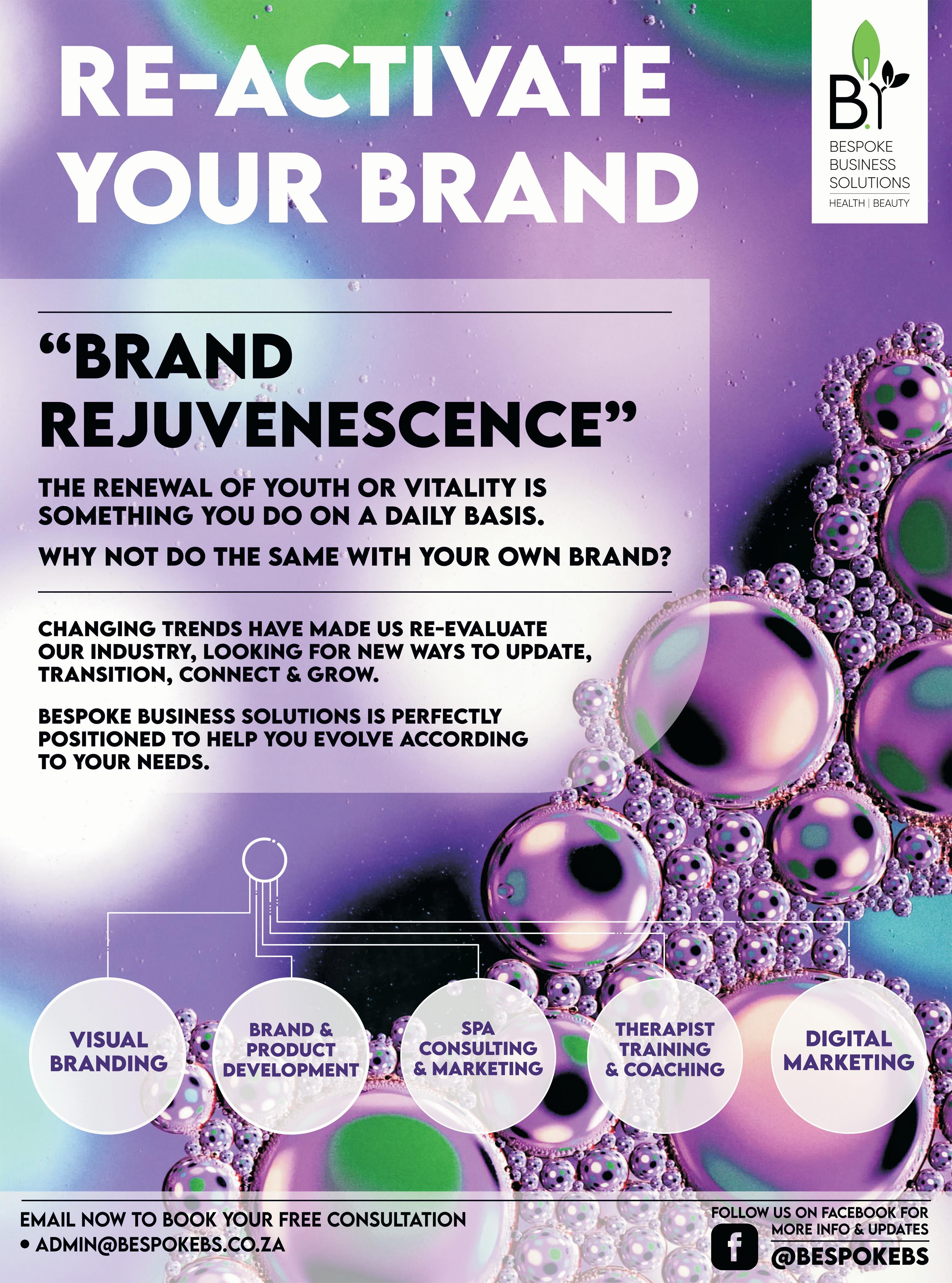
19 minute read
The Importance of Personal Renewal

Renewal holds an immediate appeal. In marketing it is the magic word motivating buyers of vitamins, diets, skin creams, and exercise machines. But in reality your existence depends on every cell in your body knowing with perfect precision how to renew itself. There are hardly any cells in your body today that were there when you were born, and certain types of cells (skin, stomach lining, and red blood corpuscles) renew themselves in a matter of weeks.
Advertisement
These well-known medical facts point to a hidden secret, for it isn't physical renewal that holds the key. Imagine a house where the bricks fly in and out of the walls, yet the building is always standing. Its blueprint remains intact even as physical objects constantly change. Your body's blueprint remains intact thanks to the invisible intelligence contained in every cell.
Instead of looking to DNA for the source of this intelligence - DNA is just another piece of the physical picture - the secret lies with how your body uses its intelligence. You can renew yourself by consciously using the same principles that keep your body in a natural state of renewal.
Here are the principles: 1. Cells live in the present. 2. Cells cooperate with each other. 3. Cells understand that the whole is greater than the parts, and they live for the whole. 4. Cells are not afraid of death. 5. Cells accept life as a process that never ends, and they do not resist the flow.
These principles come from the same source in pure awareness that governs everything in Nature. Whatever the physical benefits, meditation is a more powerful tool for consciousness, because in meditation we come closer to the source, and this strengthens the flow of intelligence without doing anything else. But every day is filled with activity, and you can cooperate with your body's creative intelligence by adopting the five principles. 1. Living in the present. By now everyone has heard these words, but they need to be carried out. Cells have no choice but to live in the present. It comes naturally to them, and it does to you and me, too, unless our minds pull us out of the present. The simplest way to be present is to notice when you aren't. In a moment of distraction, stress, anger, anxiety, or boredom, take a few deep breaths, center yourself, and wait quietly until you feel calm and centered. That's what it feels like to be in the present moment without effort or strain.
2. Cooperation. The value of cooperation is that you gain the support of others while in turn you support them. Research has shown that adding each new support group, system, or person adds to your lifespan. Happiness is correlated with being in communication every day with someone you personally value. So look upon cooperation as bonding. When you bond, you renew a relationship that nurtures both people in the relationship.
3. Wholeness. You cannot make yourself whole, because you are already whole. You are merged into the stream of life, and everything that happens in collective consciousness includes you. This is why it is important to identify with a higher consciousness, in order to realize that there is a field of infinite possibilities from which you draw life, love, imagination, creativity, and personal growth. In wholeness you are constantly renewed, because the field of infinite possibilities has something new to offer you every day, if you are open, alert, and ready to receive.
4. Immortality. Fear of death is a human creation, and it comes from the ego. “I” is committed to selfpreservation, but there is the undeniable fact that the physical body will one day pass away. This makes the ego's search for immortality fear-based. When we stop identifying with the limited, separate, isolated “I,” fear of death ends. Consciousness and existence are immortal. They are the real source of immortality. In meditation the mind settles down to experience the silence and peace of pure awareness. Simply by being here, you are merged into the field of immortality, as you have always been and always will be. Know that this is true, and let your experience of inner silence become established. As this happens, the fact of your freedom form death will dawn on its own, as naturally as knowing that you exist.
5. Flow. This is another term that almost everyone has heard. To translate it into reality can be reduced to a few simple things. Don't resist. Pause before you say no. Witness and appreciate what is going on around you. The opposite of flow is resistance and it is rooted in the need to defend yourself. Yet almost always the mind's reaction of self-defense is pointless and unnecessary. Know this, and put into practice the habit of seeing what happens next without putting up anger, fear, worn-out reactions, and resistance.
It creates a real breakthrough when you look at these five principles and realize that they say the same thing: You are connected to renewal naturally and effortlessly. All you need to do is to let the process of renewal become part of your outlook on life. The bodymind is one thing, an expression of consciousness. You are the conscious agent at the center of the whole project of being here now. See this as your main role in life. In reality every moment in your life has been merged into the eternal now. Once you accept that as your vision, renewal will be yours to celebrate. Consider the humble life of trillions of cells whose only mission is to serve you. They have much to teach.
By Deepak Chopra MD
About DEEPAK CHOPRA™ , founder of The Chopra Foundation, a non-profit for research on well-being and humanitarianism, and Chopra Global, a whole health company at the intersection of science and spirituality, is a world-renowned pioneer in integrative medicine. and personal transformation. He is the author of over 90 books translated into over 43 languages, including numerous bestsellers. TIME magazine has described Dr. Chopra as “one of the top 100 heroes and icons of the century.”

Succeeding in an Era When Clients Define and Drive Service Concepts, as Never Before

By Richard Takach, Jr. President & CEO, Vesta Hospitality
At its most fundamental, the hospitality industry has always been about anticipating and responding to the needs of its guests. Treat guests as you would like to be treated and you will be rewarded with their patronage, genuine appreciation and loyalty. Operating revenues and profitability will follow.
However, in our modern era, this imperative has been complicated and challenged in several ways. For starters, even within individual brand platforms and asset classes, both leisure and business travelers are not necessarily looking to have as standardized a guest experience as in generations past. It's not "plug and play" anymore. The key is the ability to modify the experience at any given property to meet as many guest expectations as possible. Be flexible and always try to view any stay from the guest's perspective.
Guests want more choices in arrival and departure times; room location and, perhaps, furnishings; food and beverage offerings; in-room entertainment and broadband capabilities; fitness centers; and so on. And as our industry matures, aided by technology, we should be able to customize the hotel experience in new and better ways, allowing the guest to further define her or his experience.
This development, coupled with new technologies, the advent and prevalence of social media, and ever-present labor pressures, has important implications that impact our hiring strategies, training protocols and everyday operations.
Some of these trends have been intensified during the pandemic. On the one hand, direct bookings, keyless entry, self-check-in and other contactless services have continued to grow in preference, all of which reduces demand on staff. On the other hand, hotels are receiving more pre-visit queries than ever before concerning mask policies, social distancing, housekeeping and sanitation standards, or food and beverage availability. There's a lot to handle and our hospitality industry is doing a great job in informing guests about their prospective needs.
Great Guest Service Starts With Making the Right Hire
successful hospitality and wellness company. The headaches can come from the need for accurate budgeting and forecasting, revenue management, maximizing the value, raising equity or debt to continue to grow or simply managing the egos in the executive office or calming an angry guest.
Still, many hoteliers / wellness directors will say that the most stressful aspect of hospitality is not any of those, but, rather, the hiring process. Yes, guest service comes down to hiring people who understand and can embody our mission statement, guiding philosophies and organizational culture; and, most importantly, have a natural sentiment for caring for others and like working with them in a personal relationship. If you are not inclined to serve others, you are probably not in the right business. The right person, when hired correctly using the tools available, can have a positive effect. On the flip side, we must be cautious about hiring the "wrong" person who could have a deleterious impact. The lesson: every single hire is important to the success of a hospitality and wellness organization.
The entire hiring journey begins with notices of job availability, made more expansive these days with the many job and career websites as well as many industry specific job sites that now exist. However, don't neglect traditional recruiting techniques like executive recruiting firms; working with schools and colleges; post-pandemic job fairs; as well as personal referrals. The most valuable of these is referrals from current employees.
Next comes the interview process, including any follow-up interviews; background checks; and the use of analytical and behavioural tools to help determine a candidate's aptitude for specific positions. The latter, in combination with benchmarking of top performers, is proving extremely useful in the hiring process.
The Predictive Index (PI) is one such useful tool. In measuring the four traits of Dominance, Extraversion, Patience and Formality, a job candidate is further benchmarked against top performers in an organization and what their traits are. In practice, these tools are proving quite valid in matching traits and personalities to qualities required of specific positions. Many organizations are finding it valuable to conduct these PI assessments all the way down to line level staff, another great example of investment in our people.
Also, there is a tendency to be lackadaisical about background checks and references. Always verify references, but remember that some references in today's business world may withhold valuable information due to legal concerns. Do conduct your own investigations. The most useful reference checks come from professional relationships and keeping one's ear to the ground.
Any hiring must be followed by quality training and continuing education programs, which is critical to guest service and retaining and grooming outstanding talent for the organization. This starts with brand training programs and building on with our comprehensive, organization-specific ones. The goals: give new hires the tools and confidence to perform their tasks well, which should be continually upgraded; and offer a path to career advancement for those so inclined. Here, as elsewhere, technology is allowing us to offer highly reliable, self-paced programs for team members, fully integrated with comprehensive human resources functions.
Empowering Staff is Essential to Modern Client Service
Driven by advancements in technology, which has revolutionized how we interact with guests; driven by brand standards; and driven by guest expectations and the greater world of commerce, our ultimate goal is to empower team members with the authority to solve service issues at the lowest and quickest level possible. The simple fact is the higher up a chain of command the guest complaint rises, the less likely there will be a positive outcome.
Astute organizations take this a step further, by endorsing what we might call a "100 percent guarantee." Today's most useful service standard: don't argue, don't negotiate, don't try to be clever, just make things right. We will give you the tools to do this and have your back as you exercise your powers of discretion.
other cases, the guest will only be pleased in other ways. It is our job to figure that out and make it happen. Amazingly, the most effective solution to exceeding guest expectations may not even be a costly one. A favorite product is unavailable. Pick it up and have it available for the client as soon as possible. Clients visiting for a special occasion, present them with a small gift. A couple is celebrating an anniversary- thank them for choosing your spa with a special remembrance.
Simple things that display appreciation and thoughtfulness can earn their weight in gold with customer loyalty. At the same time, many new receptionists don't understand that if a guest took the time to mention an issue, we must do something about it. Simply thinking the guest wasn't upset isn't reason to stop. If a guest bothered enough to bring something up, it is our duty to respond and "close the loop" in a positive way.
Empowered staff has done an outstanding job during these challenging times, helping instill confidence in the public and providing customized service to clients. In addition to empowerment, financial incentives are important motivators for client service.
Managing the Technology End-Around
In days past, you could easily pick that angry guest out of the crowd. These days, more and more guests check in through contactless services and, often, the "shouting' or angry stare comes through in the form of an email or text complaint. Often, out of the blue, even straight to a brand or social media before the guest has checked out! Our task is to be alert to these newer forms of "confrontation," as well as praise, ready to respond promptly, remembering to make things right as soon as possible.
These experiences will suggest new ways of getting ahead of issues, including using on-property text communication systems to stay in touch with guests throughout their stays. We must also continually monitor those online reviews and other social media comments and respond appropriately. The goal is always the same: nip any guest dissatisfaction in the bud and do everything possible to exceed expectations.
Be Willing to Experiment
The world of hospitality and wellness will continue to grow in complexity with new brands and independent platforms, new consumer behaviors, an evolving work force and new technologies at all levels. Aided by technology and our people, inventive operators will research and imagine new ways of personalizing the guest experience and offer multiple forms of added value, both the expected and the pleasant surprise. One of the richest sources of ideas on how we can improve things for our guests come from the associates who are closest to them. We need to encourage their participation, listen to their suggestions, and take each one under consideration.
Our industry is blessed with creative and inquisitive individuals, helping to constantly reinvent our industry concepts of guest and client service, as they gradually evolve over time. Following their lead, the best organizations must be willing to experiment in the area of guest service, within established brand and organizational parameters.
For example, we may be able to extend the concept of a personal concierge throughout a guest's stay. Or there maybe new ways, including through friendly competition, to build improved team work, sense of responsibility and problem-solving skills. Your staff member has a new idea for responding to guest surveys or partner with other businesses in your location? Many such initiatives are not costly. Let them have a go at it.
Hire carefully and train well. Challenge and empower team members. Listen closely to guests. Try out new strategies that keep hospitality and wellness fresh and exciting. Our guest and client service and, as a result our success and sense of fulfillment, will be all the better for it.
About Mr.Richard Takach Jr, co-founded Vesta Hospitality with a vision of creating unique hotels that offer the finest in quality and service. With 30+ years of experience in the industry, he has a reputation for attracting and retaining talented professionals who in turn create award-winning hotels with outstanding customer satisfaction. Before Mr. Takach served as Regional Manager for the Marriott Corporation, and spent seven years as Executive Vice President of Dimension Development Company. He has served on Hilton Hotels' Advisory Council and was Chairman (2007/8) of the Owner's Association for InterContinental Hotels Group.

By Carol Stewart MSc, FInstLM

Quietly Visible
Networking: How to Move from Fear to Fabulous
With a lack of research on introverted leadership and the vast majority of leadership research privileging extroversion, it is always great when I come across researchers who focus on introverted leadership. I spoke to Leatrice Oram PhD, about her research on introverted leaders. We discussed her research and findings, and she shares plenty of takeaways that introverted leaders can apply to thrive as leaders and in life.
It's often not what you know but who you know that gets you a look in when it comes to opportunities. And with a rumoured 70-80% of senior executive roles, and 75% of all jobs filled through the hidden job market, if you're not making networking part of your leadership progression repertoire, you could be missing out.
In the lunch & learn session, I did on networking tips for introverted leaders, someone asked about steps to do it effectively. Here's how you can make networking work for you.
Why Introverts Don't Like Networking
Some people mistakenly think that introverts don't like networking because we are shy, socially awkward, and lack confidence. However, this is a mistaken belief because whilst this may apply to some people who are introverted, it also applies to some extroverted people too.
The reasons, include: •They are overly stimulating environments • We don't generally like making small talk • They think that they have to work the room and speak to as many people as possible.
They Are Overly Stimulating Environments
Introverts are overly stimulated by spending too long in busy, social environments. It can be energy draining and make us want to retreat into ourselves. When we feel like this, we are less likely to want to engage in conversation, which can come across as aloof. So, if you find the environment overly stimulating, pop out for some fresh air, or do some other activity that helps you to recharge. prefer depth of conversation over quantity. However, when you are meeting someone for the first time, small talk may be necessary to flow into a more meaningful conversation. Have a few conversation starters up your sleeve and use these to segue into something more meaningful. Ask open questions, listen to the response, pick up on something, then ask another open question. Repeat this a few times, and as they ask you questions in return, the conversation will start to flow. Introverts are well known for their listening skills, so play to your strengths.
They Think They Have To Work The Room
Networking is often thought of as being an opportunity to speak to as many people as possible, and many introverts think they have to work the room. The thought of this is off putting. However, you don't have to speak to as many people as possible if you don't want to. Instead, be more targeted in your approach. If you know who will be at the networking event in advance, identify those people you want to meet.
Get There Early
When groups have formed and conversations are in full flow, it can feel awkward trying to edge your way in. If breaking into groups is a challenge for you, make sure you get there early.
Approach Groups Of Odd Numbers
If groups have already formed, approach groups of odd numbers and you will feel less like an outsider. With groups of even numbers, it is easier for people to pair up, making it more challenging to get your foot in. When you approach the group, don't just barge your way in and take over. Say hello, briefly introduce yourself, and ask if it is ok for you to join. Gauge the flow of the conversation and when appropriate, join. However, don't hesitate too long waiting for the appropriate moment.
Making The Most Of Virtual Networking
When you attend virtual meetings or events, engage in conversations with others in the chat. Connect with the people you meet on LinkedIn and arrange to have a virtual coffee meeting. Make the most of social media platforms to develop and grow your network. Engage with your connections' posts and share articles and podcasts that are of value to them.
Go to your organisation's LinkedIn company page, and connect with those you want to connect with. Likewise, if you are looking to make a career transition, go to the company pages of organisations you want to work at, look at the people who work there that you want to connect with, and send them a connection request.
Reframe How You View Networking
If you have a negative view of networking, change your perspective about it. I once had a client who was a solicitor and business development was part of her role. She hated networking with a passion. By helping her to reframe how she saw networking, she came to view it as an opportunity to meet people, and she could then develop and nurture those relationships. If her company's services would benefit them, she could let them know this.
Changing her perspective in this way, changed how she felt. By changing how she felt, she began to enjoy networking. What is a more helpful perspective for you to have about it?
Don't Make It All About Me, Me, Me
Don't go networking with the sole purpose of being out for what you can get. Or in response to the question that was asked of me, make it just about getting a job. If so, you may come across as desperate or selfish and put people off. View it as an opportunity to expand your network, meet interesting people, and to develop and nurture relationships beyond the networking event. And remember, it's not just what you can get out of it, relationships work two ways. What can you do to help those you meet as well?
Love it or hate it, networking is essential to business?
About Carol Stewart: I am an Executive and Career Coach specialising in introverted women who are senior leaders. I've been the featured expert in Women and Home Magazine, Good Housekeeping Magazine, the Telegraph, on BBC Radio 5 Live, named a LinkedIn Top Voice UK 4 years running, and received awards for my work developing women leaders.












